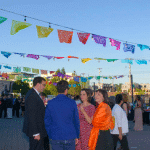Show, Don’t Tell
You have all of the fundraising event pieces in place: venue, catering, auction items, speakers. But what laces them all together into a compelling program that will engage your donors and deepen their support of your good work?
Stories.
Connecting people through shared stories is one of the most powerful ways you have to communicate the impact of your work to your donors. A barrage of statistics and internal program lingo can create distance between you and your guests, yet compelling personal stories can reel them right in.
At their 25th Anniversary Once Upon a Tree Gala, Friends of Trees actually made storytelling their theme. They brought together a talented group of local authors to tell stories of their connection to trees, and through this they invited their audience to think back and remember that tree they loved. To remember the stories of their life that took place in and around trees. To dream about the importance of planting trees for the generations to follow. It took the evening out of the realm of numbers and environmental impact and placed it squarely in the heart of the donor, which capitalized on the human connection to do the work instead. Donors loved the program and Friends of Trees was able to raise the funds they need to continue planting the trees of tomorrow. See author Brian Benson’s story from the event below.
Center for Women’s Leadership held their annual luncheon a few weeks ago and engaged alumnae of their various programs to speak about their personal stories. The personal narratives brought to life the connection these strong, empowered, future leaders have with CWL and by example, showed the impact of CWL’s amazing work. They spoke about their dreams of going to college, what they’ll study, what inspires them and what they want to do with their life all as a result of their time spent in CWL’s leadership programs. And they were able to do this in front of a room of hundreds of people because they believed in themselves. You can talk all day long about your impact, but why not show it? See special appeal speaker Elba Moise’s story:
It can feel like a big risk to step out of the results and program based language that is necessary for other forms of funding, like grants, and engage the emotional core of personal stories. But, as always, for individual donors that connection yields powerful results. People give to people, and what better way to do that at an event than tapping the hardwired form of communication humans are born to understand: stories.
Brian Benson’s Story from Once Upon a Tree for Friends of Trees
I grew up in a lake-spattered, thickly forested area known as the Northwoods of Wisconsin. When viewed on a map, or from the seat of a passing plane, the place is a stunning mess of deep green and scattershot blue, woods and water. It’s a sort of Midwestern tourist hotspot, and all year, people come up from Chicago (and suburban Chicago, and exurban Chicago) to rent cabins, cast for bass and walleye, speed snowmobiles across frozen lakes. They come to sink into the woods and water—into what they’d seen from afar, from above.
As a kid, I didn’t think the place was particularly stunning. I just thought it was home. I never sat back and admired it—I was just in it. It was a pretty good place to be in, too. In the fall, I collected and pressed maples leaves with my mom. Come winter, I sledded and skated and dug snowcaves with my sister. And every summer, I biked back roads, walked deer trails deep into the woods, had mud monster wrestling matches in a boggy lake with my best friend Luke.
So, yeah, I lived in a beautiful spot. And, yeah, I was still a dreamy kid, my imagination not yet dulled by standardized tests and spreadsheets. I had no excuse, really, to get tired of my home.
But I did. I got tired of lakes. Tired of trees. Tired of not having Nintendo.
This one summer day, though, I was at my house with Luke. We’d grown tired of whatever we were doing—which, at that point, was probably videotaping ourselves dunking on a rim lowered to six feet—so we decided to head to the lake across the road. We’d swam there like 900 times that summer, and were totally bored with it, but it was windy, and we were hoping for whitecaps. So we left the yard, ducked into a trail my dad had cut into a tangle of oak and maple, followed a boardwalk he’d built through lakeshore swamp. The water came into view, and I thought I could see some whitecaps, and just as I was about to step onto the beach and get a better look, I heard Luke say, “I’m gonna climb that tree.”
I turned, followed Luke’s eyes over to a big, scraggly red pine beside the boardwalk. Its first branch was barely in reach, the rest were awful far apart, and the distant top was tossing about in the wind. Over on the other side of the boardwalk, there was another big pine, almost identical to the one Luke had chosen—given the unwritten rules of preteen masculinity, I now had to climb it.
I was a little scared, but more than that, I was curious. I loved tree-climbing, but I’d never tried this one. I always tended to choose trees deep in the woods—not out in the open, like this.
Luke went to his pine, I to mine. We started climbing, inching up our trees, scratching knees and wrists on the bark, saying the few swear words we knew when our fingers found sap. At first, I kept looking right, making sure I was climbing higher, faster. But soon, I was looking only up, thinking only of the next branch. I took in deep pulls of pine tar, felt needles brushing against my back.
Suddenly, I was out of branches. I was at the top. I looked to make sure I’d beaten Luke—which, I don’t remember, but I’m gonna say I did—and then, at last, I looked down, at the lake and the woods beyond, the silver-blue and deep green rolling out beneath me. And as I perched atop that tree, taking in this lake I’d visited so many times—this place that felt so familiar—I felt like I was looking not just at my home, but at a map of it. I was seeing it as the tourists saw it—as a paradise of greens and blues, a place much bigger than I’d ever imagined. I didn’t feel bored anymore. Somehow, I felt proud.
My rapture didn’t last long. Because as soon as I stopped moving, I noticed that the wind was roaring, the treetop swaying, the trunk making this really disconcerting creaking sound. Luke and I traded looks that said the words boys never say aloud, and we climbed down, left the lake, resumed dunking.
Now, I’m not going to try and tell you that tree changed everything. In the days and weeks and years to come, I still got bored, still forgot where I was.
But I climbed that tree again. And again.
I always wanted to tell people about it—about that first climb, especially. But I didn’t know how. When I tried, I’d just end up saying, “I climbed a real tall tree by a lake and it was cool.” I mean, maybe that’s what I’m doing right now. I hope not. Because what I’m trying to say, I think, is that while I haven’t climbed that scraggly pine for awhile, I still climb trees. Lots of them. I climb for the smell of the sap, the feel of the bark under my hands, for a perspective I might not have otherwise had. I climb for the same reason I gather maple leaves from sidewalks, take photos of the first cherry blossoms, stop on coastal hikes to stare at gnarled sitka spruce and wonder, “What happened here?” I pay attention to trees, because they make me pay attention to everything else—because they’re a reminder that all around me, so much more has happened, is happening, could happen, than I usually let myself imagine.






